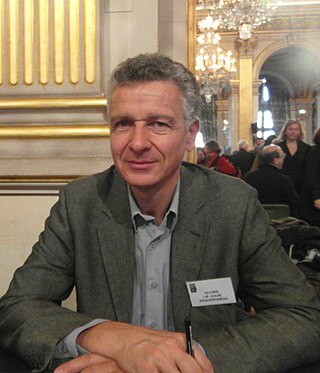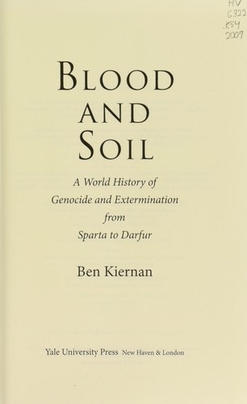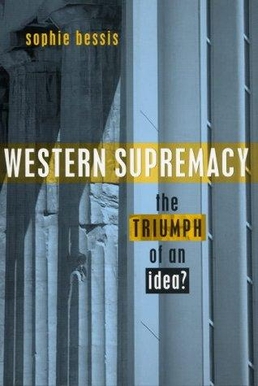
Heart of Darkness (1899) is a novella by Polish-English novelist Joseph Conrad in which the sailor Charles Marlow tells his listeners the story of his assignment as steamer captain for a Belgian company in the African interior. The novel is widely regarded as a critique of European colonial rule in Africa, whilst also examining the themes of power dynamics and morality. Although Conrad does not name the river on which most of the narrative takes place, at the time of writing, the Congo Free State — the location of the large and economically important Congo River — was a private colony of Belgium's King Leopold II. Marlow is given a text by Kurtz, an ivory trader working on a trading station far up the river, who has "gone native" and is the object of Marlow's expedition.
Racism is discrimination and prejudice against people based on their race or ethnicity. Racism can be present in social actions, practices, or political systems that support the expression of prejudice or aversion in discriminatory practices. The ideology underlying racist practices often assumes that humans can be subdivided into distinct groups that are different in their social behavior and innate capacities and that can be ranked as inferior or superior. Racist ideology can become manifest in many aspects of social life. Associated social actions may include nativism, xenophobia, otherness, segregation, hierarchical ranking, supremacism, and related social phenomena.
White supremacy is the belief that white people are superior to those of other races and thus should dominate them. The belief favors the maintenance and defense of any power and privilege held by white people. White supremacy has roots in the now-discredited doctrine of scientific racism and was a key justification for European colonialism.
The World Conference Against Racism (WCAR) is a series of international events organized by UNESCO to promote struggle against racism ideologies and behaviours. Five conferences have been held so far, in 1978, 1983, 2001, 2009 and 2021. Founded after World War II and the Holocaust as a dependent body of the United Nations, UNESCO started as soon as it was created to promote scientific studies concerning ethnic groups and their diffusion in public opinion to dispel pseudo-scientific rationalizations of racism. One of its first published works was The Race Question in 1950, signed by various internationally renowned scholars.

Leif Erland Andersson was a Swedish astronomer.

Oba Ovonramwen Nogbaisi, also called Overami, was the thiry-fifth Ọba of the Kingdom of Benin reigning from c. 1888 AD – c. 1897 AD, up until the British punitive expedition.

Sven Oskar Lindqvist was a prolific Swedish author whose 35 books range from essays, aphorisms, autobiography, and documentary prose to travel and reportage. He was educated at Stockholm University, and spent a year as a cultural attaché in Beijing, but spent most of his life as a writer, known for his persistence and independence. In the 1970s he established the public history movement Dig Where You Stand. From the late 1980s he focused on European imperialism, colonialism, racism, genocide, environmental degradation, and war. Among his best-known and most widely admired works are his 1996 discussion of racism, Exterminate All the Brutes, based on a phrase in Joseph Conrad's Heart of Darkness, and his 2001 A History of Bombing, an intentionally fractured narrative written in 399 short chapters.

Olivier Le Cour Grandmaison, is a French political scientist and author whose work chiefly centres on colonialism. He is best known for his book Coloniser, Exterminer - Sur la guerre et l'Etat colonial.

"An Image of Africa: Racism in Conrad's Heart of Darkness" is the published and amended version of the second Chancellor's Lecture given by Nigerian writer and academic Chinua Achebe at the University of Massachusetts Amherst in February 1975. The essay was included in his 1988 collection, Hopes and Impediments. The text is considered to be part of the postcolonial critical movement, which advocates to Europeans the consideration of the viewpoints of non-European nations, as well as peoples coping with the effects of colonialism. In the work, Achebe accuses Joseph Conrad of being "a thoroughgoing racist" for depicting Africa as "the other world".

Blood and Soil: A World History of Genocide and Extermination from Sparta to Darfur (ISBN 978-0300100983) is a 2007 book by Ben Kiernan, who for thirty years has studied genocide and crimes against humanity. In Blood and Soil, Kiernan examines outbreaks of mass violence, including worldwide colonial exterminations and twentieth-century case studies, particularly the Armenian genocide, the Nazi Holocaust, Stalin's mass murders, and the Cambodian and Rwandan genocides. The book won the 2008 gold medal for the best book in History awarded by the Independent Publishers Association. In 2009, Blood and Soil won the German Studies Association's biennial Sybil Halpern Milton Memorial Book Prize for the best book published in 2007 or 2008 dealing with Nazi Germany and the Holocaust in its broadest context, covering the fields of history, political science, and other social sciences, literature, art, and photography. In June 2009, the book's German translation, Erde und Blut: Völkermord und Vernichtung von der Antike bis heute, won first place in Germany's Nonfiction Book of the Month Prize.

Racism and xenophobia have been reported and investigated in Sweden. Sweden has the most segregated labor market of people with foreign background in Europe, when measured against both high and low educational level by OECD statistics. According to the European Network Against Racism, skin color and ethnic/religious background have significant impact on an individual's opportunities in the labor market.

Sagan om Sune is a Swedish children's chapter book, written by Anders Jacobsson and Sören Olsson and originally published in 1984. It tells the story of Sune Andersson during the spring term of the 1st grade at school in Sweden. Anders originally wrote the stories when doing his military service, while Sören illustrated. Originally, the stories aired over SR Örebro, the radio station in Örebro.

Kvitt eller dubbelt — Tiotusenkronorsfrågan was a Swedish game show based on the American version called The $64,000 Question. It was the first game show to be broadcast on Swedish television and became one of the most watched television shows of the 1950s and 1960s. The show was hosted by Nils Erik Bæhrendtz and produced by Allan Schulman. The show was aired on SVT between 1957 until 1981. The show is one of the titles in the book Tusen svenska klassiker (2009). In each episode a number of contestants answered questions about a specific subject that they had chosen beforehand. If all questions was answered correctly they won 10.000 (SEK).

...och stora havet is the debut studio album by Swedish pop singer Jakob Hellman. It was released on February 13, 1989 by EMI.
The Dig Where You Stand movement is an international public history and adult education movement promoting public participation in research in local history, especially labor history. It began in Sweden in the 1970s and was given its shape by Sven Lindqvist in his book Gräv där du står (1978). Following the movement's success in Sweden, it was taken up in other Western countries.
Exterminate All the Brutes is an internationally co-produced documentary television miniseries revolving around colonization and genocide, directed and narrated by Raoul Peck. The series consists of four episodes and premiered in the United States on April 7, 2021, on HBO. It premiered in the United Kingdom on May 1, 2021, on Sky Documentaries. The series takes its name from Sven Lindqvist's book with the same name, on which it is partially based, a phrase which Lindqvist in turn borrowed from Joseph Conrad's novella Heart of Darkness, in which the quote "Exterminate all the brutes" appears.

Western supremacy: triumph of an idea? is a book about development studies, international relations and sociology written by award-winning Tunisian-born French historian, journalist, researcher, and feminist author Sophie Bessis.

American Holocaust: Columbus and the Conquest of the New World is a multidisciplinary book about the indigenous peoples of the Americas and colonial history written by American scholar and historian David Stannard.
The Apocalypse of Settler Colonialism: The Roots of Slavery, White Supremacy, and Capitalism in 17th Century North America and the Caribbean is a book by Gerald Horne. It is a historical analysis of the development of settler colonialism in North America and the Caribbean in the 17th century. Sarah Barber from the Lancaster University Department of History reviews the book and concludes "Writing accessible history is never easy, and this is a laudable addition." David Waldstreicher, Professor of History at the Graduate Center of the City University of New York, British colonizers committed counter-revolution—revolting against crown and against the threat from below—to increase their control over land and people.
The Dawning of the Apocalypse: The Roots of Slavery, White Supremacy, Settler Colonialism, and Capitalism in the Long Sixteenth Century is a book by Gerald Horne, a Professor of African American History at the University of Houston. The book offers a historical analysis of the development of settler colonialism in North America in the 16th century.















